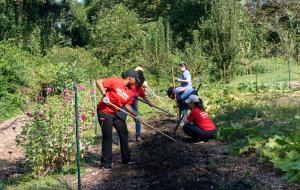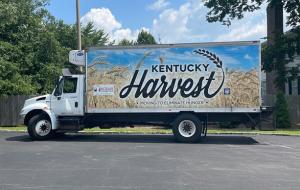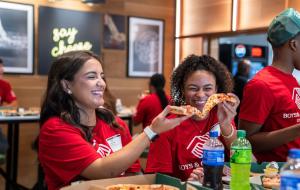ENSURING FOOD QUALITY & SAFETY
The Papa Johns Global Food Safety Program covers our entire supply chain—from our suppliers and Quality Control Centers to Papa Johns restaurants. Relevant Papa Johns food service and restaurant team members receive food safety training that includes safe ingredient handling, team member health and hygiene, and cross-contamination. Team members also receive regular safety updates and reminders throughout the year. We engage with industry groups, such as the National Council of Chain Restaurants, the National Restaurant Association and the National Retail Federation, to ensure that we have access to best-in-class resources, address common food safety issues and find shared solutions to supply chain challenges.
We work to ensure all our suppliers have undergone a third-party food safety audit.
In addition, we conduct annual quality audits of our ingredient suppliers and provide feedback through our supplier scorecard.
CORPORATE ANIMAL WELFARE POLICY
Papa John’s International (“Papa Johns”) is built on a commitment to BETTER INGREDIENTS. BETTER PIZZA.® and we are committed to improving animal welfare throughout our supply chain.
We have identified that all our menus include products from dairy animals (predominantly cows, but also extending to goats), egg laying and meat producing chickens, pigs and beef cattle. Regional product variations, aimed at meeting local customer expectations, include veal, sheep, turkey, salmon and shrimp.
Supplier Engagement
We value our relationship with suppliers and our shared commitment to animal welfare. Although Papa Johns does not breed, process, transport, own or raise animals, we expect our suppliers to have the highest standards commercially available with respect to animal welfare. Papa Johns specifies that proper and humane animal welfare practices should be followed during every step of processing. These expectations are outlined in our supplier agreements and specifications, including compliance with United States Department of Agriculture (USDA) regulations on the humane treatment of animals. Many of Papa Johns suppliers do not directly own, raise or transport live animals; therefore, we mandate that all suppliers to Papa Johns require that their suppliers also comply with USDA regulations.
It is also important that the safety and quality of the product not be affected by evidence of stress from poor handling, stunning or production practices. These expectations are outlined in our supplier agreements and specifications, irrespective of what animal-derived product is being supplied.
In addition, we encourage our suppliers to go beyond these requirements and investigate alternatives to current farming, transporting and processing practices that would result in a higher quality of animal care.
Antibiotics
In 2015, Papa Johns became the first national pizza chain to pledge to remove antibiotics from our grilled chicken pizza toppings and chicken Poppers.
In 2016, we transitioned our chicken toppings and Poppers to a ‘No Antibiotics Ever’ standard. Due to ongoing global supply chain disruptions in recent years, we have experienced challenges sourcing chicken in the US that meets this standard. As of 2021, these items have been sourced from supply chains that do not use antibiotics important to human medicine (NAIHM) to ensure we can keep serving these menu items to our customers.
Cage-free Eggs
Papa Johns is committed to transitioning 100% of eggs and egg ingredients for Papa Johns proprietary menu items coming exclusively from cage-free suppliers by 2030. To inform and develop this goal, we engaged with Lever Foundation, a non-profit organization working with companies to advance more humane and sustainable supply chains.
In 2016, we began using cage-free eggs across our menu in North America; currently more than 90% of the eggs we purchase are from cage-free sources. In our UK market, we’ve used only cage-free eggs since 2018.
In some regions, limited or no supply of cage-free eggs exists, and there is no current pathway for a commercially viable supply. We plan to work with suppliers and key partners in these regions to increase the availability of cage-free egg sources.
Sow Housing
In 2013, restaurant companies across the industry, including Papa Johns, announced commitments related to alternative housing for sows (pregnant pigs). At the time, Papa Johns aligned with these commitments with the expectation that the pork industry would also move in this direction. However, the industries did not develop as expected. Further, we have limited influence to dictate terms to our suppliers given our size. The volume of pork we purchased in 2021 for company-owned and franchised restaurants in the U.S. represented less than 0.4% of total U.S. pork consumption.
In 2022, we surveyed our suppliers to assess their readiness to supply pork raised in supply chains that use alternative housing; currently a significant source of such product is not yet available, and we expect to adjust our goal as we work with suppliers on evaluating best practices and availability for the industry.
We continue working with our suppliers to identify—and encourage the creation of—more sources of pork raised in alternative housing options. Ultimately, our aim is to ensure our strategy moving forward is aligned with the evolution of the pork industry and with best practices for animal care, while also being commercially viable.
Broiler Chicken Welfare
We support industry-wide efforts focused on broiler chicken welfare across the supply chain, including responsible breeding, improved living conditions and enrichments, additional space per bird and more humane processing methods. Global supply chain disruptions and shortages across our restaurants and the wider industry in recent years have presented challenges in advancing these commitments.
We are surveying our poultry suppliers to understand their readiness to supply commercially available chicken that is aligned with these commitments and other best practices.
Stakeholder Engagement
We recognize that customers, team members, investors, NGOs and other stakeholders have diverse perspectives on a variety of animal welfare topics. We are committed to engaging with stakeholders about our progress and challenges as we continue to evolve our animal welfare policy.
Governance
Animal welfare is a key component of our Responsible Sourcing strategy and Environmental, Social and Governance (ESG) framework. The Corporate Governance and Nominating Committee of the Papa Johns Board of Directors provides oversight for our ESG strategy (for further details visit https://ir.papajohns.com/corporate-governance-0). Papa Johns Quality Assurance and Supply Chain Management teams have day-to-day responsibility for fulfilling our animal welfare commitments.
Papa Johns is committed to reviewing our animal welfare policy regularly. As new information becomes available through scientific research, industry standards, and regulations, we will update our policy and work with our suppliers to ensure the highest standards commercially available are in place with respect to animal welfare.
In our UK business segment, we have expanded our animal welfare policy to meet local customer expectations. Details of these animal welfare policies can be found here: https://www.papajohns.co.uk/about- us/animal-welfare.aspx.
Updated March 2023
Published February 2022
ENVIRONMENTAL & CLIMATE CHANGE STATEMENT
Introduction & Scope
Papa Johns is built on the promise of Better Ingredients. Better Pizza. This commitment extends across all aspects of our business, including taking steps to address our environmental impacts.
The Papa Johns Environmental and Climate Change Statement articulates our approach to environmental stewardship for our corporate-owned operations in the United States. Where Papa Johns does not have operational control, such as with franchisee operations and suppliers, we encourage our partners to adopt similar commitments.
Our Priorities
We comply with all applicable environmental regulations and operate our business with an aim to reduce our environmental impacts. Based on findings from our 2020 Materiality Assessment, we have identified the following priority areas:
- Sustainable Packaging & Materials Management. Papa Johns has been a leader in sustainable packaging since 2015, when we began using pizza boxes made from certified sustainable, 100 percent natural fiber. Today, all of our boxes are produced by suppliers that are certified to the SFI Certified Sourcing Standard. We explore opportunities to increase the use of sustainable packaging materials, reduce single- use packaging through our reusable dough trays and increase recycling and divert waste, where possible.
- Sustainable Agriculture. We recognize that how our ingredients are produced has a direct impact on the planet. We screen our suppliers carefully and strive to work with suppliers to improve agricultural practices throughout the supply chain. On a related matter, our animal welfare strategy is detailed in our Corporate Animal Welfare Policy (see above).
- Food Waste. We are committed to reducing food waste throughout our operations and supply chains. We seek to continuously improve our processes, through employee training and improved forecasting tools and inventory management systems. When we do have surplus food, we donate it through the Papa Johns Harvest Program to community partners serving those in need.
- Greenhouse Gas Emissions. To reduce greenhouse gas emissions associated with our Quality Control Centers, restaurants, fleet operations and corporate hubs, we work to conserve energy and fuel use, improve energy efficiency and explore the sourcing of renewable energy.
Our Position on Climate Change
Papa Johns recognizes that greenhouse gas emissions affect our climate and that human activity is a key driver of climate change, as established by the UN Intergovernmental Panel on Climate Change. We believe businesses have an important role in addressing climate change by implementing initiatives to reduce emissions within their control, and through mitigation and adaptation initiatives outside their immediate influence, where feasible.
We are aware that climate change may pose certain risks to our business. These risks are managed through our Enterprise Risk Management program (detailed in our Proxy Statement) and may include the physical impacts of climate change, the availability of ingredients, government regulation and other market or transition risks.
Papa Johns recently completed our first greenhouse gas inventory, using the Greenhouse Gas Protocol Corporate Standard, to better understand where emissions occur across our corporate operations
and to inform our strategy. We are proud of the initiatives we have already implemented to reduce greenhouse gas emissions across our company-owned Quality Control Centers, restaurants, fleet operations and headquarters.
Our Governance
The Corporate Governance and Nominating Committee of the Papa Johns Board of Directors provides oversight for the Company’s initiatives and reporting on sustainability and ESG matters (for further details visit papajohns.com/corporate-governance ). The Engineering team within Papa Johns Food Service has day-to-day responsibility for implementing associated initiatives.
We commit to monitoring our progress annually through appropriate environmental metrics and publicly reporting on key developments at least every two years. We will regularly review and update our position as new information and best practices become available through scientific research, industry standards, regulations or internal analysis.



